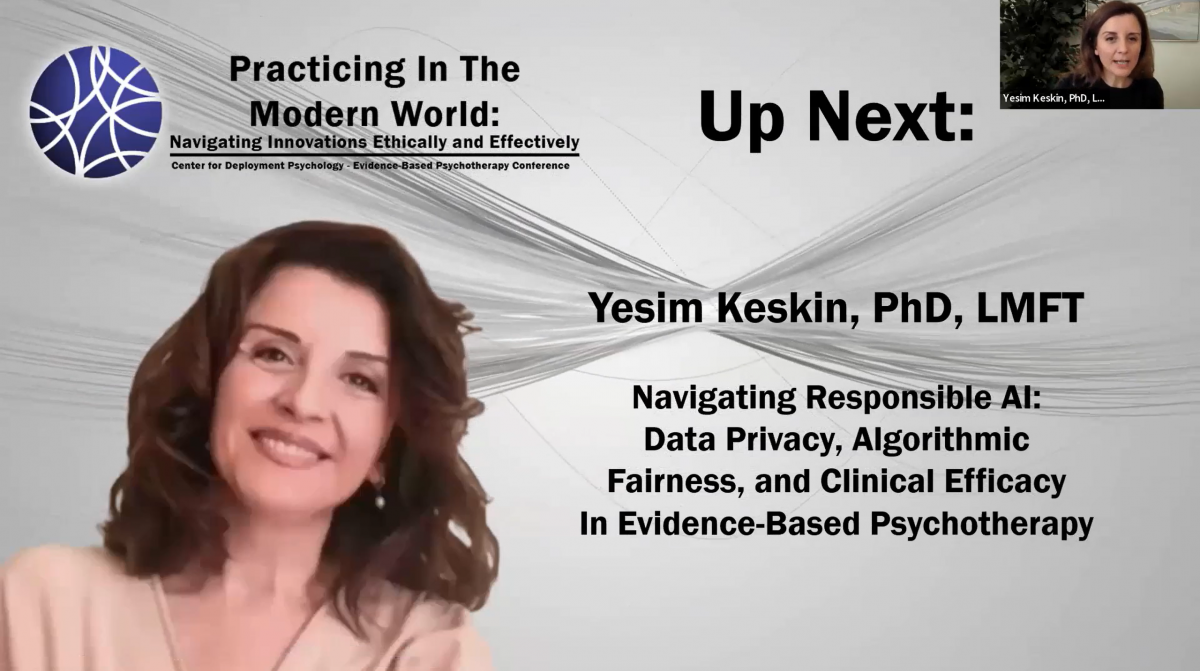The Center for Deployment Psychology hosted our fifth annual Evidence-Based Psychotherapy conference, online via Zoom, 8 May 2025 with optional pre-meeting institutes on 7-8 May 2025. This year, our theme was Practicing in the Modern World: Navigating Innovations Ethically and Effectively.
The behavioral health field is always evolving. Some innovations undoubtedly advance our practice; for example, the boom of telehealth increased client access. Other innovations raise more questions than answers. In order to maintain a rewarding practice, we must consider how to navigate innovations ethically and effectively.
If you weren't able to join us for the live event, we are happy to be able to provide recordings of each of the presentations. In addition to the full conference, we have also include two of the Pre-Meeting Institute presentation, "The Adaptive Value of Emotions and How to Decrease Aggression" and "Ethics in Digital Health - A Guide to Approach the New Way We Practice" as well. Click on any of the below titles to view a video of the presentation. Please note, the below recordings are for informational purposes only and do NOT include CE credits.
Click here to visit the 2024 EBP Conference Archive.
Click here to visit the 2023 EBP Conference Archive.
Click here to visit the 2022 EBP Conference Archive.
Click here to visit the 2021 EBP Conference Archive.
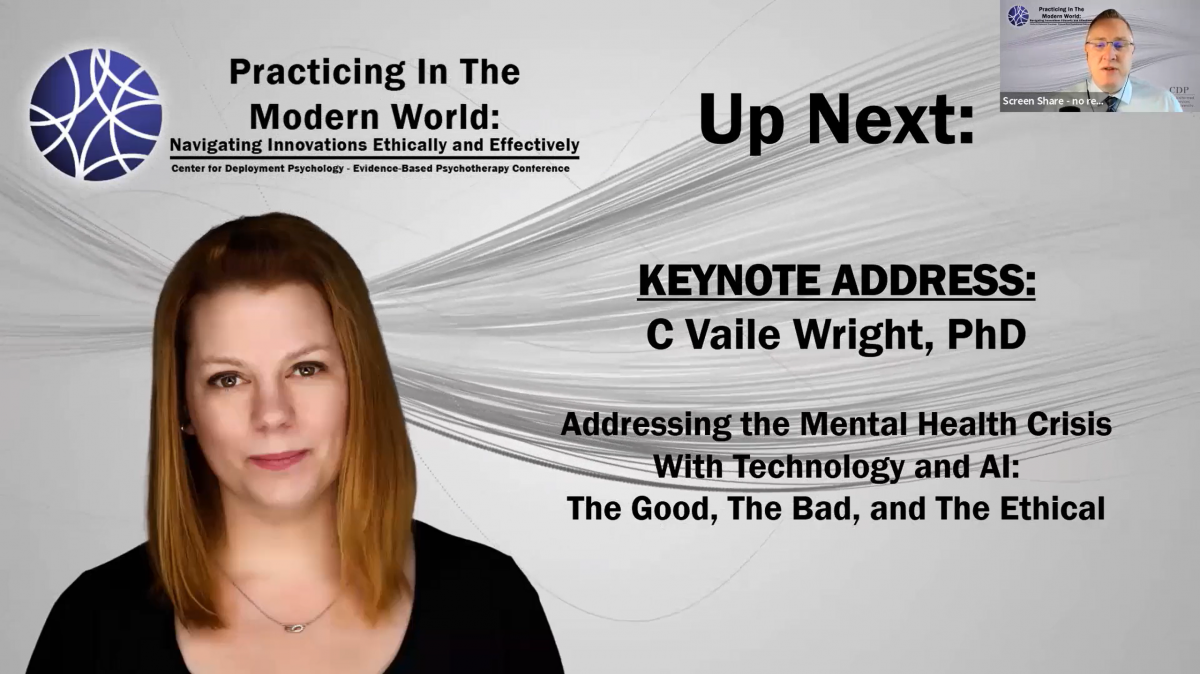 Addressing the Mental Health Crisis with Technology and AI: The Good, the Bad, and the Ethical by Vaile Wright, Ph.D. :
Addressing the Mental Health Crisis with Technology and AI: The Good, the Bad, and the Ethical by Vaile Wright, Ph.D. :
Mental health digital tools have the potential to increase and expand access and options to care and improve population health and health equity. However, regulatory confusion, ethical concerns, and reimbursement barriers potentially stand in the way of scalable dissemination and implementation of these novel tools. This program will describe existing and emerging technologies and the evidence supporting their use, their potential to increase access to care and improve health equity, and what is being done to ethically and responsibly address the existing barriers within healthcare.
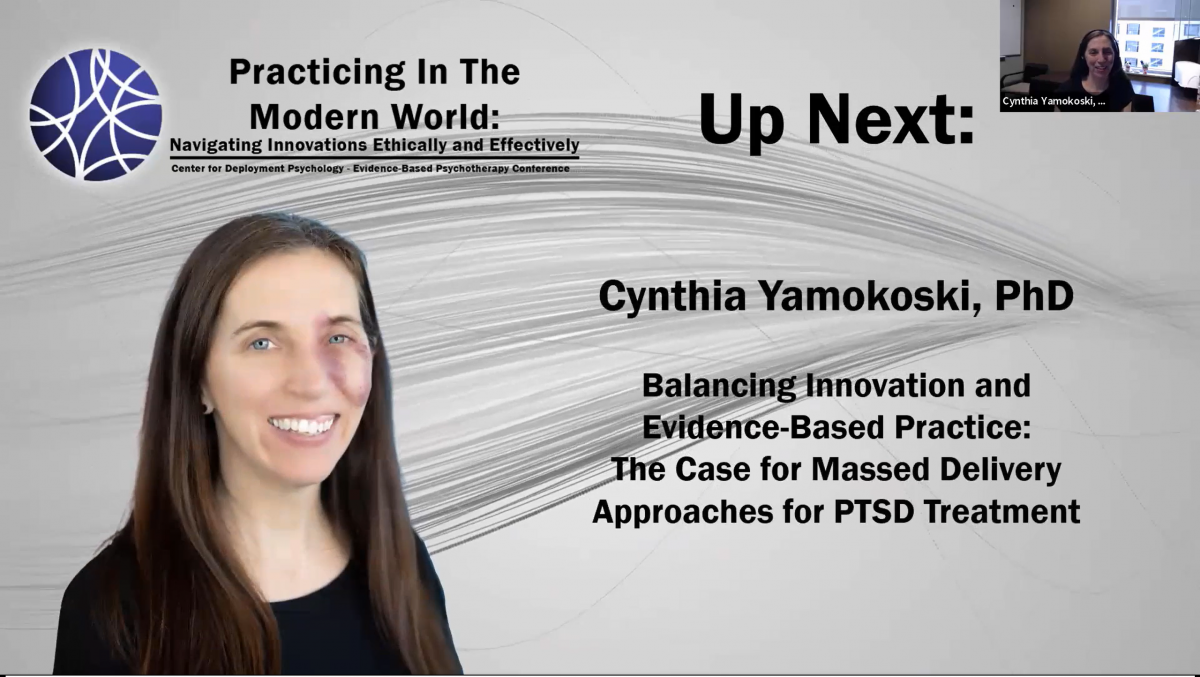 Balancing innovation and evidence-based practice: The case of massed delivery approaches for PTSD treatment by Dr. Cynthia Yamokoski: Despite the support for the effectiveness of trauma-focused treatment for PTSD, there remain numerous barriers and challenges to care delivery. When faced with these barriers and challenges, one option is to consider how care is delivered instead of re-inventing the wheel and creating new treatments all together. Emerging research demonstrates support for the feasibility and effectiveness of massed treatments for PTSD. In this presentation, the presenter will provide an overview of the progression of these findings and address strategies to implement this treatment delivery innovation in larger healthcare systems. The process of studying, development of buy-in, and additional barriers and facilitators to implement change will be explained and discussed.
Balancing innovation and evidence-based practice: The case of massed delivery approaches for PTSD treatment by Dr. Cynthia Yamokoski: Despite the support for the effectiveness of trauma-focused treatment for PTSD, there remain numerous barriers and challenges to care delivery. When faced with these barriers and challenges, one option is to consider how care is delivered instead of re-inventing the wheel and creating new treatments all together. Emerging research demonstrates support for the feasibility and effectiveness of massed treatments for PTSD. In this presentation, the presenter will provide an overview of the progression of these findings and address strategies to implement this treatment delivery innovation in larger healthcare systems. The process of studying, development of buy-in, and additional barriers and facilitators to implement change will be explained and discussed.
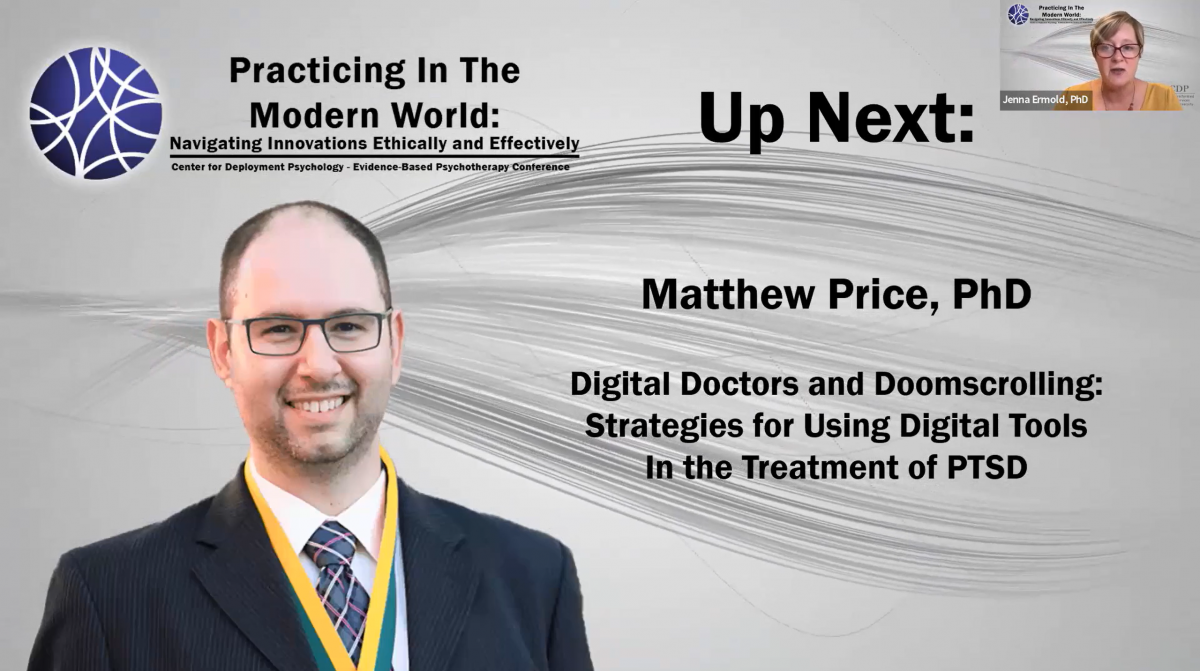 Digital Doctors and Doomscrolling: Strategies for Using Digital Tools in the Treatment of PTSD by Dr. Matthew Price: The discussion will explore the role of mobile devices in the maintenance and treatment of posttraumatic stress disorder (PTSD). We will discuss how different types of mobile phone usage—such as social media, gaming, and web browsing—are associated with trauma-related psychopathology, highlighting both risks (e.g., doomscrolling, avoidance) and potential therapeutic benefits. Recommendations for clinicians working with veterans will be made, with an emphasis on the need for thoughtful engagement with technology rather than outright avoidance
Digital Doctors and Doomscrolling: Strategies for Using Digital Tools in the Treatment of PTSD by Dr. Matthew Price: The discussion will explore the role of mobile devices in the maintenance and treatment of posttraumatic stress disorder (PTSD). We will discuss how different types of mobile phone usage—such as social media, gaming, and web browsing—are associated with trauma-related psychopathology, highlighting both risks (e.g., doomscrolling, avoidance) and potential therapeutic benefits. Recommendations for clinicians working with veterans will be made, with an emphasis on the need for thoughtful engagement with technology rather than outright avoidance
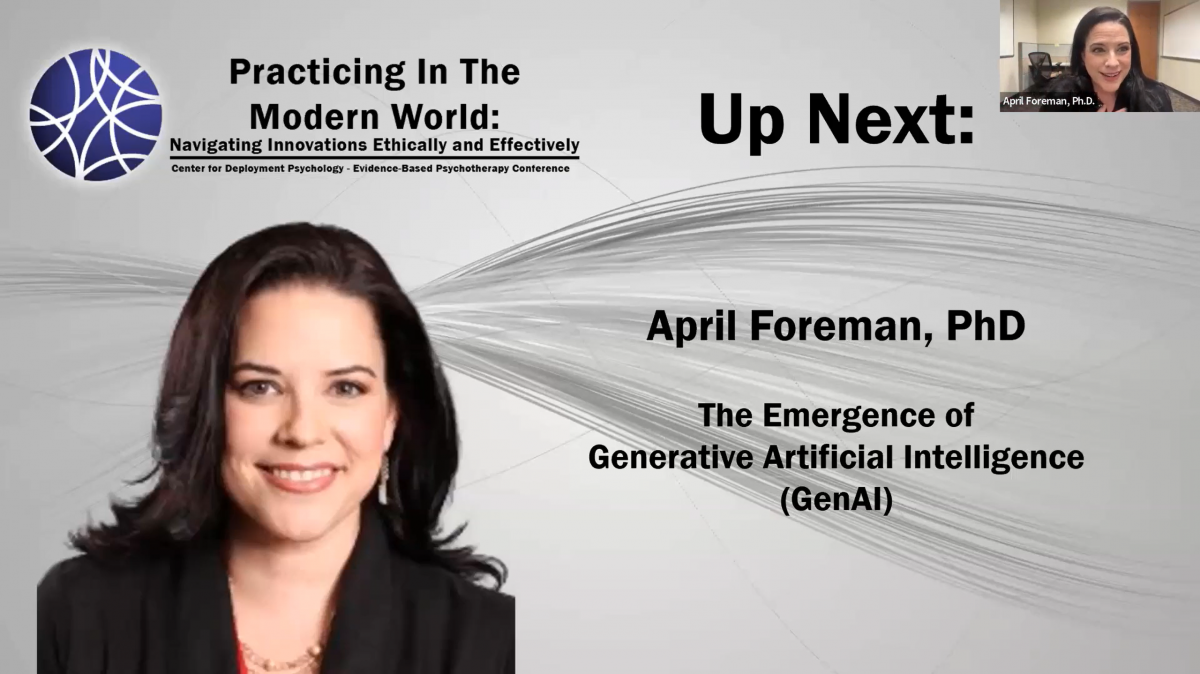 The Emergence of Generative Artifical Intelligence (GenAI): by Dr. April Foreman.: This presentation will discuss a framework for the ethics and optics considerations in adoption of generative AI technology as a part of participant’s clinical practice. The presenter will cover common generative AI use cases that apply to clinical work and note which uses cases are likely appropriate for adoption, which ones may require caution, and which use cases are likely prohibited.
The Emergence of Generative Artifical Intelligence (GenAI): by Dr. April Foreman.: This presentation will discuss a framework for the ethics and optics considerations in adoption of generative AI technology as a part of participant’s clinical practice. The presenter will cover common generative AI use cases that apply to clinical work and note which uses cases are likely appropriate for adoption, which ones may require caution, and which use cases are likely prohibited.
 Scaling Single-Session Interventions to Bridge Gaps in Mental Health Ecosystems by Dr. Jessica L. Schleider: The discrepancy between need and access to mental health support is incontestable. Due to provider shortages, high treatment costs, and myriad structural barriers, up to 80% of youth and 50% of adults with mental health needs go without services each year. Status-quo mental health systems will never meet population-level needs for support, creating a need for a “Mental Health Moonshot” in the United States. Single-session interventions (SSIs) are well-positioned to rapidly increase access to evidence- based supports at precise moments of need, both within and beyond formal health care systems. SSIs mitigate key treatment access-barriers: many are self-guided (requiring no therapist) or deliverable by non-professionals; web-based (completable from any location); and 5 to 60 minutes in length, eliminating premature treatment dropout. SSIs are also effective. To date, >400 randomized trials have shown their capacity to reduce mental health problems and increase uptake of further treatment, with sustained positive impacts up to nine months later. This presentation will provide an overview of recent scientific and clinical advances in developing, evaluating, and disseminating evidence-based SSIs for diverse populations, both within and outside of traditional healthcare systems.
Scaling Single-Session Interventions to Bridge Gaps in Mental Health Ecosystems by Dr. Jessica L. Schleider: The discrepancy between need and access to mental health support is incontestable. Due to provider shortages, high treatment costs, and myriad structural barriers, up to 80% of youth and 50% of adults with mental health needs go without services each year. Status-quo mental health systems will never meet population-level needs for support, creating a need for a “Mental Health Moonshot” in the United States. Single-session interventions (SSIs) are well-positioned to rapidly increase access to evidence- based supports at precise moments of need, both within and beyond formal health care systems. SSIs mitigate key treatment access-barriers: many are self-guided (requiring no therapist) or deliverable by non-professionals; web-based (completable from any location); and 5 to 60 minutes in length, eliminating premature treatment dropout. SSIs are also effective. To date, >400 randomized trials have shown their capacity to reduce mental health problems and increase uptake of further treatment, with sustained positive impacts up to nine months later. This presentation will provide an overview of recent scientific and clinical advances in developing, evaluating, and disseminating evidence-based SSIs for diverse populations, both within and outside of traditional healthcare systems.
Navigating Responsible AI: Data Privacy, Algorithmic Fairness, and Clinical Efficacy in Evidence-Based Psychotherapy by Dr. Yesim Keskin, Ph.D., LMFT: The rapid emergence of artificial intelligence in mental health care promises to revolutionize psychotherapy by enhancing assessment, treatment personalization, and accessibility. However, these advances also bring critical concerns: How can clinicians uphold client privacy amidst large-scale data collection? Which steps help prevent algorithmic biases from undermining equitable care? How do we maintain clinical rigor and therapeutic rapport in the face of automated interventions? This session provides a concise roadmap to navigate responsible AI within evidence-based psychotherapy by centering on three core pillars. First, data privacy and security focuses on best practices for safeguarding sensitive client information and satisfying regulatory requirements such as HIPAA and GDPR. Second, algorithmic fairness addresses the identification and mitigation of biases in AI models, ensuring equitable treatment recommendations for all client populations. Finally, clinical efficacy and therapeutic alliance highlights the integration of AI tools that align with established protocols while preserving empathy, rapport, and the foundational human connection in tech-assisted care. Through case examples, emerging research, and practical evaluation strategies, attendees will learn how to ethically and effectively incorporate AI tools into their practice, ensuring that innovation remains balanced with professional responsibility and client welfare.
 Putting It All Together: Practicing in the Modern World - Closing Panel by C. Vaile Wright, Ph.D., Cynthia Yamokoski, Ph.D., Matthew Price, Ph.D., April Foreman, Ph.D., Jessica Schleider, Ph.D.: Innovation is changing clinical practice at breakneck speeds. As our conference speakers will describe throughout the day, new challenges often accompany every advancement. In our closing panel, we'll integrate the lessons learned from our speakers' innovative practices, from changing the frequency and duration of treatment to responsibly incorporating AI tools. Practical recommendations will be offered for attendees who wish to incorporate these tools and methods into their evidence-based practice.
Putting It All Together: Practicing in the Modern World - Closing Panel by C. Vaile Wright, Ph.D., Cynthia Yamokoski, Ph.D., Matthew Price, Ph.D., April Foreman, Ph.D., Jessica Schleider, Ph.D.: Innovation is changing clinical practice at breakneck speeds. As our conference speakers will describe throughout the day, new challenges often accompany every advancement. In our closing panel, we'll integrate the lessons learned from our speakers' innovative practices, from changing the frequency and duration of treatment to responsibly incorporating AI tools. Practical recommendations will be offered for attendees who wish to incorporate these tools and methods into their evidence-based practice.
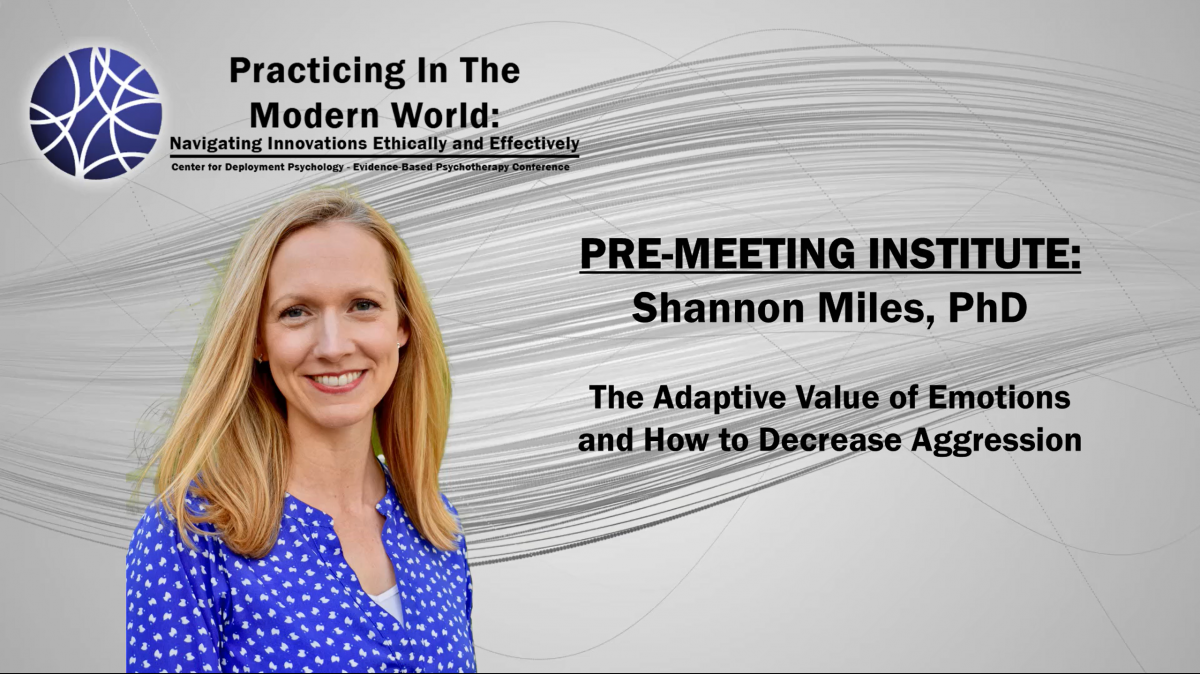 PMI: The Adaptive Value of Emotions and How to Decrease Aggression by Dr. Shannon Miles: Aggression can have devastating interpersonal and societal consequences, including incarceration, family violence, disruption of social support, and death. Veterans and service members with posttraumatic stress disorder (PTSD) have higher rates of impulsive aggression, characterized as emotionally charged, reactive, and difficult to control, compared to veterans and service members without PTSD. Impulsive aggression is not targeted through traditional evidence-based psychotherapies (EBP) for PTSD. Emotion regulation ability is a key factor in reducing impulsive aggression. Our team developed a 3-session emotion regulation treatment (Manage Emotions to Reduce Aggression; MERA) to help veterans and service members reduce aggression. This training will introduce the adaptive value of emotions, including anger, sadness, disgust, happiness, and fear. Then it will teach providers have to deliver the brief intervention, MERA, which has demonstrated reductions in aggressive behavior.
PMI: The Adaptive Value of Emotions and How to Decrease Aggression by Dr. Shannon Miles: Aggression can have devastating interpersonal and societal consequences, including incarceration, family violence, disruption of social support, and death. Veterans and service members with posttraumatic stress disorder (PTSD) have higher rates of impulsive aggression, characterized as emotionally charged, reactive, and difficult to control, compared to veterans and service members without PTSD. Impulsive aggression is not targeted through traditional evidence-based psychotherapies (EBP) for PTSD. Emotion regulation ability is a key factor in reducing impulsive aggression. Our team developed a 3-session emotion regulation treatment (Manage Emotions to Reduce Aggression; MERA) to help veterans and service members reduce aggression. This training will introduce the adaptive value of emotions, including anger, sadness, disgust, happiness, and fear. Then it will teach providers have to deliver the brief intervention, MERA, which has demonstrated reductions in aggressive behavior.
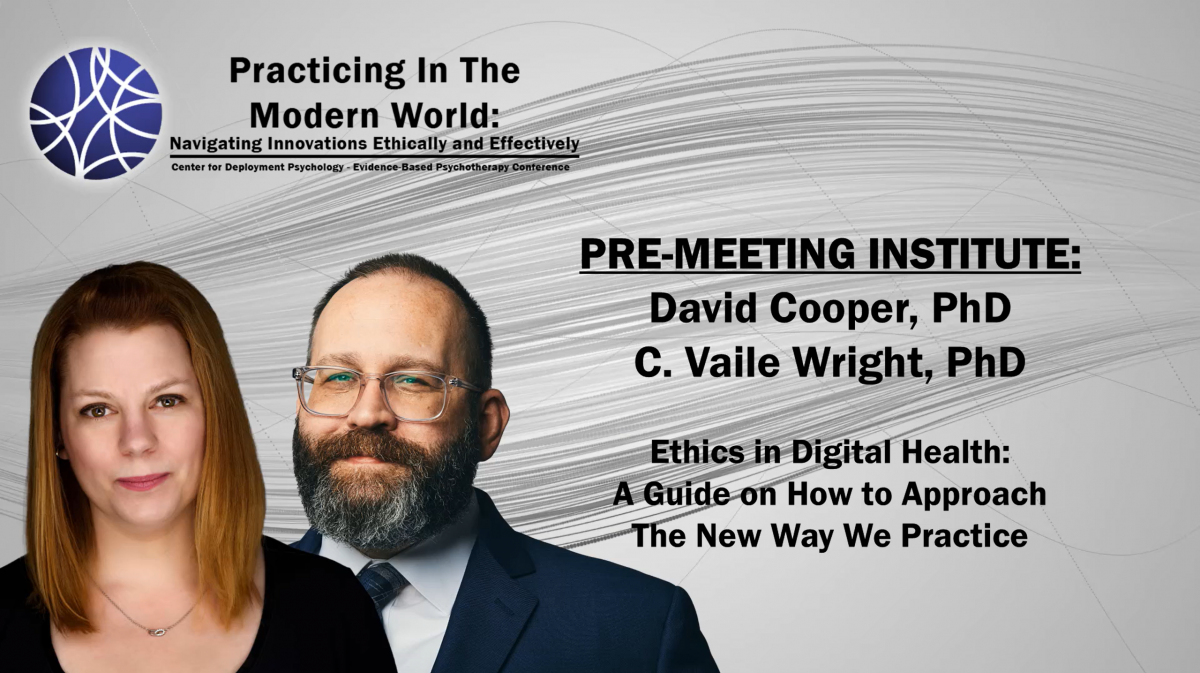 PMI: Ethics in Digital Health - A Guide to Approach the New Way We Practice by Vaile Wright, Ph.D. & Dr. David Cooper, Psy.D.: Digital health transforms healthcare, offering incredible potential but also complex ethical challenges. From AI to telehealth, these advancements raise critical questions about patient privacy, data security, algorithmic bias, and equitable access. This intensive half- day program equips you with the essential tools to navigate these complexities. Through interactive discussions, real-world case studies, and practical frameworks, you'll gain a deep understanding of core ethical principles and develop actionable strategies for ethical decision-making.
PMI: Ethics in Digital Health - A Guide to Approach the New Way We Practice by Vaile Wright, Ph.D. & Dr. David Cooper, Psy.D.: Digital health transforms healthcare, offering incredible potential but also complex ethical challenges. From AI to telehealth, these advancements raise critical questions about patient privacy, data security, algorithmic bias, and equitable access. This intensive half- day program equips you with the essential tools to navigate these complexities. Through interactive discussions, real-world case studies, and practical frameworks, you'll gain a deep understanding of core ethical principles and develop actionable strategies for ethical decision-making.

